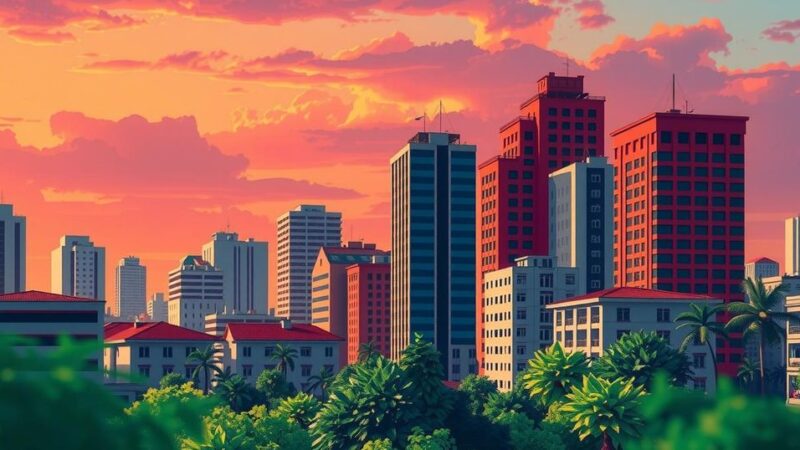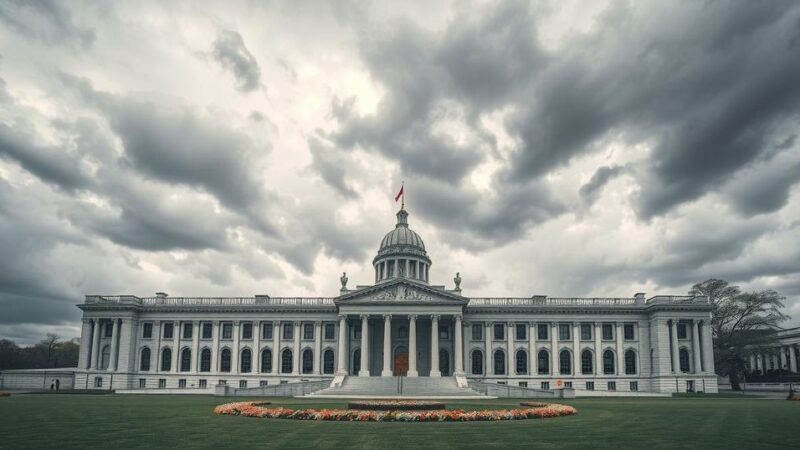In Caracas, six Venezuelan opposition members sheltering in the former Argentine embassy face severe harassment from Nicolás Maduro’s government. Argentina, Brazil, and the OAS are advocating for their safe passage as tensions mount. Amid allegations of surveillance and utility disruptions, the plight of these figures highlights the political turmoil following Venezuela’s disputed presidential election.
In Caracas, the escalating plight of six Venezuelan opposition figures who have sought refuge in the former Argentine embassy is drawing international concern. These political dissidents, facing severe harassment and threats from Nicolás Maduro’s government, have reported increased surveillance, utility disruptions, and arrests of local embassy staff. Argentina and Brazil, alongside the Organization of American States (OAS), are advocating for their safe passage as tensions with the Maduro administration continue to intensify.
The opposition members—three men and three women—began sheltering in the diplomatic compound in March 2024. Initially protected by Argentina, responsibility for their security shifted to Brazil in August after the expulsion of Argentine diplomats. However, Maduro’s government invalidated Brazil’s authority to oversee the compound by September, exacerbating the already precarious situation.
Facing severe conditions, one opposition leader, Magalli Meda, recounted their dire existence, marked by intense surveillance from armed agents, as well as deliberate cutbacks on essential utilities like water and electricity. Furthermore, the recent arrest of an Argentine embassy staff member signifies a worrying escalation in hostility. Meda articulated the urgency of the situation: “We are seeing how the process of violating our basic human rights is accelerating. It’s urgent to stop this repression, whether psychological or physical.”
Venezuela’s government has vehemently rejected the opposition’s allegations. Interior Minister Diosdado Cabello dismissed their claims as a “farce,” while Maduro’s administration has consistently resisted external pressure to grant the opposition figures safe passage. The backdrop to this crisis is rooted in the contentious July 28, 2024, presidential election, which both Maduro and opposition leader María Corina Machado claim to have won, resulting in greater political polarization within the country.
To combat the oppression faced by the opposition members, Argentina has been vocal in its support, appealing to the OAS for diplomatic intervention. This appeal has garnered backing from numerous OAS member states advocating for an end to harassment and demanding safe exit routes for those sheltering in Caracas. Simultaneously, Brazil has played an essential role in the dialogue regarding Venezuela’s political situation, despite the challenges presented by Maduro’s government.
The situation also raises significant diplomatic concerns. The compound is considered sovereign territory, yet Maduro’s actions—enforcing armed surveillance and cutting utilities—are at odds with international law. Such violations have led to questions regarding Venezuela’s compliance with established diplomatic protocols.
Pedro Urruchurtu, one of the six individuals seeking asylum, underscored the potential deterioration of their circumstances without prompt action from regional authorities, appealing for a unified effort to address the crisis. As the opposition presses on, their safety remains an urgent issue that reflects the broader struggles within Venezuela’s ever-deepening political turmoil. The international community’s response will be crucial in determining the fate of these opposition figures and the overall trajectory of Venezuela’s political landscape.
The recent political turmoil in Venezuela has intensified following a disputed presidential election on July 28, 2024, leading to heightened repression against opposition figures. The six individuals currently sheltering in the former Argentine embassy represent a significant segment of the opposition challenging Nicolás Maduro’s administration. With serious allegations of electoral fraud and state-sponsored violence, the international community is increasingly called upon to intervene to secure their safety and uphold democratic principles in Venezuela.
The international attention towards the Venezuelan opposition figures underscores the urgent need for diplomatic intervention. As Argentina and Brazil, along with the OAS, amplify their calls for safe passage, the ongoing harassment faced by these figures highlights the grim reality of political dissent under Maduro’s regime. Addressing the humanitarian crisis while navigating the complex diplomatic landscape remains crucial for both the opposition’s survival and the restoration of democratic norms in Venezuela.
Original Source: www.newslooks.com






